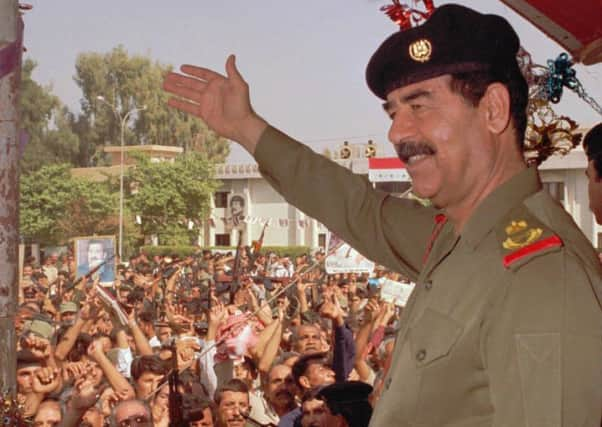Ben Lowry: I supported the Iraq war, which was a disaster. But its failure pleased despots


I had little doubt that there were weapons of mass destruction in Iraq, and not merely because the ‘dodgy dossier’ told us so.
Anyone who had paid any attention to Saddam Hussein’s actions in the preceding quarter century would have had no doubt about his capacity for wickedness.
Advertisement
Hide AdAdvertisement
Hide AdA formative time for me was the first Gulf War, which followed Saddam’s 1990 invasion of Kuwait. I was young and left-leaning politically and foolishly doubted the legitimacy of that just war (concluding, oh-so-originally, that it was “all about oil”).
But I had a teacher then who, despite being left wing, was passionately anti Saddam. He had lived in Baghdad and seen up close how vile he was, and so he was strongly pro the 1991 allied invasion.
I paid closer attention to Saddam, and saw that he would kill anyone – from relatives to whole settlements – who threatened his rule.
One of my childhood news memories had been of a distant war that was mentioned regularly, year after year, usually late in TV bulletins. It was the 1980-88 Iran-Iraq war, illustrated on the TV set behind the presenter by images of oil fields and fighters.
Advertisement
Hide AdAdvertisement
Hide AdSaddam’s foe, the Ayatollah Khomeini, was one of those demented ideologues who could at least (unlike Saddam) argue in mitigation that he thought he was making the world a better place.
The smug critique of the West’s approach to Saddam is that “we armed him”. It is true that the Americans saw him as a counter balance to the Ayatollah – no wonder after the hostage crisis. But their appreciation of the overall situation was more nuanced.
I recall in the late 1980s a US official in Time magazine saying something such as: “The problem is one of these guys is going to win.” The US cannot have been unaware that Saddam was a beast, even if they judged Khomeini a bigger threat to them (the later Rushdie saga would underline the nature of the Tehran regime).
Over the years as I watched things such as Saddam crushing the 1991 uprisings I could see how right my teacher had been. In the 1990s Saddam often blocked UN weapons inspectors.
Advertisement
Hide AdAdvertisement
Hide AdLong before Sep 11 2001, a major newspaper reported that he was developing the deadliest chemical weapons. Anyone who looked at his track record including the Halabja massacre would not have doubted his evil intent.
No-one thought Saddam was involved in 911 but after that horror it was clear that we could no longer just ignore the worst rogue states.
Note also the preceding context of the 1990s: not intervening in Srebrenica and Rwanda was seen as a moral failure. Later intervention in Kosovo and Sierra Leone were seen as a success.
The tolerance of regimes as depraved as Saddam’s made a mockery of Robin Cook’s ‘ethical foreign policy’.
Advertisement
Hide AdAdvertisement
Hide AdMr Cook in March 2003 was one of the few respected politicians to say there was no WMD. I remember his speech well and wondered if he was naive, given that he was almost a lone voice. He was, it turned out, correct.
The evidence on WMD was sexed up (even though this is a point on which two reports have cleared Blair).
Quite aside from WMDs, toppling Saddam was a disaster. Many more civilians are dead than would have been the case. The world is even more unstable than it was.
Yet while I admire dedicated pacifists (who are few) I view the ‘Not In My Name’ anti war protestors with the contempt I did in 2003.
Advertisement
Hide AdAdvertisement
Hide AdThey were so sure of their own moral goodness and yet they had – and have – nothing to say about brutal regimes or nihilistic terrorists.
Sanctions? What a joke. They impoverish the masses, not the swines at the top.
It is also absurd to talk as if getting UN resolutions is easy when you have nations as ruthless as China and Russia on the security council.
The logic of the ‘Not In My Name’ crowd was right: that we should let monstrous regimes stay in place because what follows might be worse.
Advertisement
Hide AdAdvertisement
Hide AdAs for the hundreds of millions of people who live under them? Tough.
But protestors were not honest enough to admit this (or sharp enough to realise it).
I could write thousands of words on Tony Blair’s shortcomings but Iraq is a time when he seemed to see some truths clearly and not to be driven by public opinion.
He is ruined now, and in some respects deservedly. But even he does not deserve to be pilloried by the crowing fools, wise after the event, who have emerged to depict him as if he is worse than Saddam and demand prosecutions.
Advertisement
Hide AdAdvertisement
Hide AdThe Iraq debacle has led me to the conservative view that it is often best to leave imperfect things as they are.
Britain’s rigorous self-examination over Iraq has shown what an open and ultimately civilised nation it is.
But the world is a safer place this week for lunatic despots.
• Ben Lowry (@BenLowry2) is News Letter deputy editor